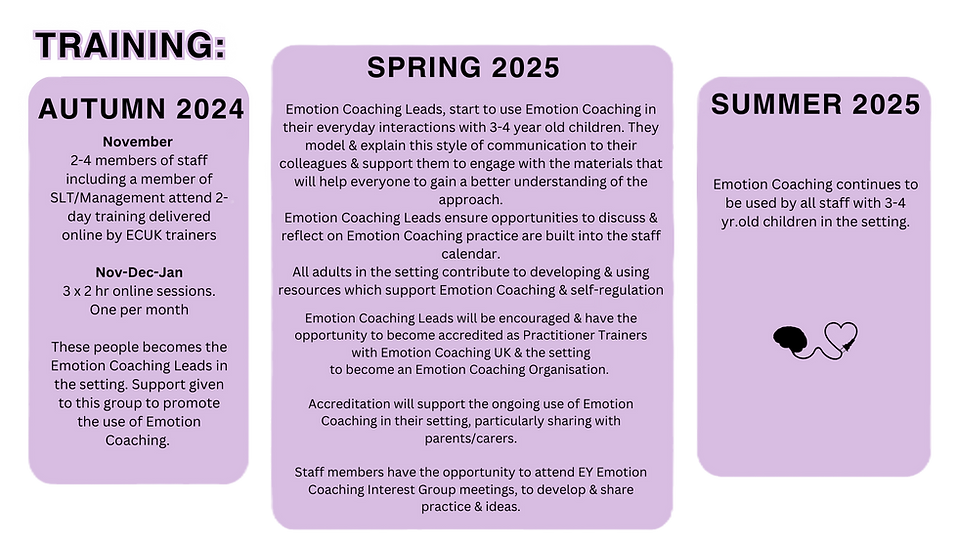support the development of self-regulation in 3-4 year olds via Emotion Coaching
_edited.png)



The project aims to support the development of self-regulation in 3-4 year olds. The way this will be achieved is through the use of Emotion Coaching by adults in your setting in their everyday interactions with children.
Not all ‘warm’ relationships are equal - not all ‘warm’ relationships are those that support the development of emotional self-regulation. Emotion Coaching enables consistency of approach and gives all staff a script to use. As a result of the training, adults have a rationale as to why they need to respond to and interact with a child in an Emotion Coaching manner and feel confident to be able to do so.


It is a sustainable universal approach and provides the building blocks for all children.
-
Emotion Coaching is for all children - it has been used successfully with children from many different cultures and with additional needs, including ASC, speech, language & communication difficulties, ADHD and English as an additional language.
-
Add it to your existing practice. Not committing to continual external input. No additional equipment is required, you become the resource!
-
Cascading training model means you don’t need to train all staff at once, but that all staff are trained. This enables high quality and ongoing CPD for all staff members, including non-teaching staff.
-
Staff feel more confident to deal with emotionally challenged and challenging children
-
Once confident in your practice you can easily share Emotion Coaching with parents and carers.

Emotion Coaching is an evidence based co-regulation strategy and comes from clinical work in families. It is based on the idea that emotions and behaviour are connected and that emotions drive behaviour. It was first observed as a naturally occurring style of communication and defined by John Gottman. John Gottman noticed that children who were Emotion Coached by their parents, achieved more academically in school, were more popular, had fewer behavioural problems, fewer infectious illnesses, were more emotionally stable and more resilient.
Our 4-step framework supports the use of Emotion Coaching
-Recognise a child's emotion and empathise with them
-Label and Validate a child's feelings
-Set expectations. Not all behaviours are ok. Teach children the expectations of a context
-Problem solve with child
The project:
Adults Emotion Coach 3-4 year old children via a cascading model of training
_edited.png)
Who we are
THE DELIVERY TEAM:
Emotion Coaching UK co-founders Licette Gus, Louise Gilbert and Janet Rose are the leaders in translating Emotion Coaching into educational and community settings in the UK. At last count, back in 2016, they had trained more than 10,000 adults in the UK, Europe and Australia. (They have since stopped counting!).

Delivery Partner- Norland College
Norland College is a Specialist Early Years HE Provider. The delivery partnership primarily provides ECUK with financial structural support. Norland College will also engage in co-providing training and supporting accreditation.
PROGRAMME COLLABORATORS:
The Stronger Practice Hubs (SPHs) and the Education Endowment Foundation (EEF) are working together to fund Early Years settings’ access to evidence-informed programmes and study the programme’s influence on practice and children’s outcomes. 8 SPHs are matched to the project.
The Early Years Emotion Coaching EEF Project is being funded as part of this programme.

Stronger
Practice
Hubs









We are looking to recruit nurseries from the 8 Stronger Practice Hubs that are involved. These cover 34 different LAs in England.
_edited.png)

Recruitment:
Recruitment is now closed.
Thank you to all of the settings who had expressed an interest in the project. We’ve enjoyed speaking with many of you and learning a little about your setting. We look forward to working with those settings who have obtained project places up and also those on the waiting list.
This infographic gives an indication of the numbers of settings that have signed up and potentially the number of children to benefit.
![15[1].png](https://static.wixstatic.com/media/623336_f62fcc9303ce4c968743c30e3e36773e~mv2.png/v1/fill/w_458,h_388,al_c,q_85,usm_0.66_1.00_0.01,enc_avif,quality_auto/15%5B1%5D.png)



_edited.png)
_edited.png)
